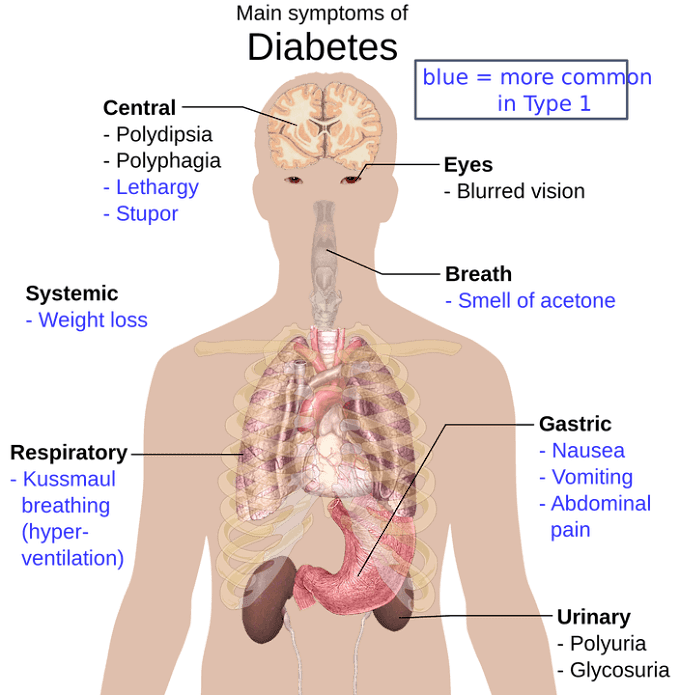Complications of Diabetes.
Understanding what diabetes is, how it is treated, and what lifestyle change. It requires can be difficult at first. It is not an easy task to assimilate all the information presented, but it is important to get as much accurate information as possible. This first step enables many people with diabetes to successfully live long and healthy lives, provided they are constantly monitored.
Improper management of blood sugar levels over a long period of time can lead to organ problems, and this is where serious complications can arise. Since diabetes directly affects blood vessels and nerves, no part of the body is immune to deterioration or even complete failure. The short-term and late complications of diabetes mellitus depend on the inappropriate treatment affecting your body and how poorly you have managed your blood sugar over a long period of time. Please review the information below to make sure you minimize the complications of diabetes.
Potential diabetes complications caused by inappropriate behavior and control include the following:
- Heart disease;
- Stroke;
- Amputation - usually of the lower extremities (legs and feet);
- Loss of vision;
- Hearing impairment;
- Bladder and kidney infections;
- Erectile dysfunction and impotence.
- WHAT ARE THE MAIN COMPLICATIONS OF DIABETES?
- Chronic complications of diabetes are usually associated with the cardiovascular system. Long-term maintenance of high blood glucose levels can damage small (microvascular disorders) and large (macrovascular disorders) blood vessels.
MICROVASCULAR DISORDERS
Excess glucose in small blood vessels damages them over time, causing visual impairment, kidney disease, nerve damage, or circulatory problems.
MACROVASCULAR DISORDERS
Excess glucose in large blood vessels can lead to coronary artery disease (heart attacks), peripheral vascular disease, or strokes.
HOW TO REDUCE THE PROBABILITY OF DIABETES COMPLICATIONS
As you can see, diabetes can cause serious diseases and lead to a deterioration in the general condition of the body. However, most of the complications associated with diabetes can be avoided with good blood sugar control and a healthy and active lifestyle. First of all, it is important that you set yourself the following goals:
- Track and regulate blood glucose levels;
- Maintain a healthy body weight;
- Eat a healthy and balanced diet;
- Avoid constant snacking on foods containing sugar;
- Reduce alcohol consumption and quit smoking;
- Be Active - Set a goal to exercise for 30 minutes every day.
WHO IS AT RISK OF DIABETES COMPLICATIONS?
If you adhere to the basic recommendations of your doctor, complications of diabetes are a problem that you will most likely be able to avoid for many years. However, people who fall into the categories listed below often have short-term and late complications of diabetes:
- Permanent inadequate diabetes control;
- Prolonged and numerous attacks of hypoglycemia and hyperglycemia;
- Unhealthy Lifestyle;
- Drinking a lot of alcohol - especially binge drinking;
- Smoking;
- Overweight and obese people.
Because some diabetes-related complications are long-term, the real consequences of poor blood sugar control may not be apparent until later in life. You may be harming yourself without knowing it, so it's important to regularly assess your health to fully understand what's going on in your body.
Regular check-ups recommended for people with diabetes include:
- Glucose control
- Tests for HbA1c
- Eye examination (optometrist)
- Hygiene feet
- Weight control
- Blood pressure measurement
- Cholesterol test
Whether you have diabetes or not, everyone should strive to lead a healthy, active, and quality life to minimize the risk of health complications later in life. In the presence of type 1 or 2 diabetes, additional measures and a better understanding of the processes occurring in the body are needed. It is important that family members and friends act as sources of support for these people because it improves the ability to stick to the regimen and get help when it is needed.
By regularly visiting your doctor or diabetes care manager, you increase the likelihood that complications of diabetes mellitus will be identified in a timely manner and, in turn, reduce the likelihood of their occurrence in principle.








0 Comments